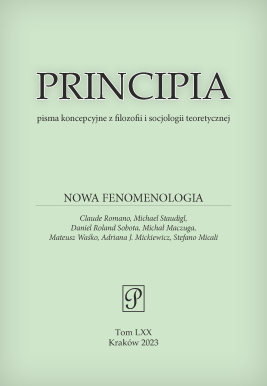Principia. Pisma koncepcyjne z filozofii i socjologii teoretycznej
Czasopismo publikuje oryginalne i nowatorskie artykuły z zakresu filozofii i socjologii.
Zgłoś tekstCzasopismo publikuje oryginalne i nowatorskie artykuły z zakresu filozofii i socjologii.
Zgłoś tekst
Pisma koncepcyjne z filozofii i socjologii teoretycznej
Opis
Principia – Pisma koncepcyjne z filozofii i socjologii teoretycznej są czasopismem Instytutu Filozofii Uniwersytetu Jagiellońskiego wydawanym w sposób ciągły od 1990 roku. Czasopismo publikuje oryginalne i nowatorskie artykuły z zakresu filozofii i socjologii.
ISSN: 0867-5392
eISSN: 2084-3887
Punkty MNiSW: 40
UIC ID: 200289
DOI: 10.4467/20843887PI
Redakcja
Redaktor naczelny (od roku 2022):
Marek Drwięga
Redaktor założyciel:
Jan Hartman
Sekretarz redakcji:
Adriana Mickiewicz
Dodatkowi redaktorzy:
Adriana Warmbier,
Maciej Kałuża,
Radosław Strzelecki
Afiliacja
Uniwersytet Jagielloński w Krakowie
Data publikacji: 21.12.2023
Redaktor naczelny: Marek Drwięga
Publikacja dofinansowana przez Instytut Filozofii Uniwersytetu Jagiellońskiego.
Michael Staudigl
Principia, Tom 70 , 2023, s. 47 - 70
https://doi.org/10.4467/20843887PI.23.002.19381Daniel Roland Sobota
Principia, Tom 70 , 2023, s. 71 - 130
https://doi.org/10.4467/20843887PI.23.003.19382Michał Maczuga
Principia, Tom 70 , 2023, s. 131 - 160
https://doi.org/10.4467/20843887PI.23.004.19383Mateusz Waśko
Principia, Tom 70 , 2023, s. 161 - 174
https://doi.org/10.4467/20843887PI.23.005.19384Stefano Micali, Adriana J. Mickiewicz
Principia, Tom 70 , 2023, s. 175 - 186
https://doi.org/10.4467/20843887PI.23.006.19385Michael Staudigl
Principia, Tom 70 , 2023, s. 47 - 70
https://doi.org/10.4467/20843887PI.23.002.19381Daniel Roland Sobota
Principia, Tom 70 , 2023, s. 71 - 130
https://doi.org/10.4467/20843887PI.23.003.19382Michał Maczuga
Principia, Tom 70 , 2023, s. 131 - 160
https://doi.org/10.4467/20843887PI.23.004.19383Mateusz Waśko
Principia, Tom 70 , 2023, s. 161 - 174
https://doi.org/10.4467/20843887PI.23.005.19384Stefano Micali, Adriana J. Mickiewicz
Principia, Tom 70 , 2023, s. 175 - 186
https://doi.org/10.4467/20843887PI.23.006.19385Data publikacji: 21.12.2020
Redaktor naczelny: Marek Drwięga
Marek Drwięga
Principia, Tom 69, Polityka i zło, 2022, s. 5 - 22
https://doi.org/10.4467/20843887PI.22.001.17312Janusz A. Majcherek
Principia, Tom 69, Polityka i zło, 2022, s. 23 - 36
https://doi.org/10.4467/20843887PI.22.002.17313Michał Bohun
Principia, Tom 69, Polityka i zło, 2022, s. 37 - 55
https://doi.org/10.4467/20843887PI.22.003.17314Radosław Strzelecki
Principia, Tom 69, Polityka i zło, 2022, s. 57 - 75
https://doi.org/10.4467/20843887PI.22.004.17315Leszek Augustyn
Principia, Tom 69, Polityka i zło, 2022, s. 77 - 105
https://doi.org/10.4467/20843887PI.22.005.17316Weronika Plińska
Principia, Tom 69, Polityka i zło, 2022, s. 107 - 136
https://doi.org/10.4467/20843887PI.22.006.17317Marek Drwięga
Principia, Tom 69, Polityka i zło, 2022, s. 5 - 22
https://doi.org/10.4467/20843887PI.22.001.17312Janusz A. Majcherek
Principia, Tom 69, Polityka i zło, 2022, s. 23 - 36
https://doi.org/10.4467/20843887PI.22.002.17313Michał Bohun
Principia, Tom 69, Polityka i zło, 2022, s. 37 - 55
https://doi.org/10.4467/20843887PI.22.003.17314Radosław Strzelecki
Principia, Tom 69, Polityka i zło, 2022, s. 57 - 75
https://doi.org/10.4467/20843887PI.22.004.17315Leszek Augustyn
Principia, Tom 69, Polityka i zło, 2022, s. 77 - 105
https://doi.org/10.4467/20843887PI.22.005.17316Weronika Plińska
Principia, Tom 69, Polityka i zło, 2022, s. 107 - 136
https://doi.org/10.4467/20843887PI.22.006.17317Data publikacji: 21.12.2021
Redaktor naczelny: Arkadiusz Chrudzimski
Gottfried Wilhelm Leibniz
Principia, Tom 68, 2021, s. 27 - 42
https://doi.org/10.4467/20843887PI.21.002.18692Grzegorz Słowiński
Principia, Tom 68, 2021, s. 43 - 63
https://doi.org/10.4467/20843887PI.21.004.18694Karol Klimaszyk
Principia, Tom 68, 2021, s. 85 - 113
https://doi.org/10.4467/20843887PI.21.005.18695Przemysław Suchanecki
Principia, Tom 68, 2021, s. 115 - 165
https://doi.org/10.4467/20843887PI.21.006.18696Paulina Pikiewicz
Principia, Tom 68, 2021, s. 193 - 213
https://doi.org/10.4467/20843887PI.21.008.18698Jakub Węgrecki
Principia, Tom 68, 2021, s. 215 - 219
https://doi.org/10.4467/20843887PI.21.009.18699Gottfried Wilhelm Leibniz
Principia, Tom 68, 2021, s. 27 - 42
https://doi.org/10.4467/20843887PI.21.002.18692Grzegorz Słowiński
Principia, Tom 68, 2021, s. 43 - 63
https://doi.org/10.4467/20843887PI.21.004.18694Karol Klimaszyk
Principia, Tom 68, 2021, s. 85 - 113
https://doi.org/10.4467/20843887PI.21.005.18695Przemysław Suchanecki
Principia, Tom 68, 2021, s. 115 - 165
https://doi.org/10.4467/20843887PI.21.006.18696Paulina Pikiewicz
Principia, Tom 68, 2021, s. 193 - 213
https://doi.org/10.4467/20843887PI.21.008.18698Jakub Węgrecki
Principia, Tom 68, 2021, s. 215 - 219
https://doi.org/10.4467/20843887PI.21.009.18699Data publikacji: 21.12.2020
Redaktor naczelny: Arkadiusz Chrudzimski
Dorota Rybarkiewicz
Principia, Tom 67, 2020, s. 27 - 47
https://doi.org/10.4467/20843887PI.20.002.13832Grzegorz Francuz
Principia, Tom 67, 2020, s. 49 - 85
https://doi.org/10.4467/20843887PI.20.003.13833Jerzy Pogonowski
Principia, Tom 67, 2020, s. 87 - 118
https://doi.org/10.4467/20843887PI.20.004.13834Mariusz Oziębłowski
Principia, Tom 67, 2020, s. 133 - 157
https://doi.org/10.4467/20843887PI.20.006.13836Włodzimierz Lorenc
Principia, Tom 67, 2020, s. 159 - 182
https://doi.org/10.4467/20843887PI.20.007.13837Andrzej Sołtys
Principia, Tom 67, 2020, s. 183 - 207
https://doi.org/10.4467/20843887PI.20.009.13839Joanna Skurzak
Principia, Tom 67, 2020, s. 209 - 232
https://doi.org/10.4467/20843887PI.20.010.13840Dorota Sepczyńska
Principia, Tom 67, 2020, s. 233 - 267
https://doi.org/10.4467/20843887PI.20.011.13841Dorota Rybarkiewicz
Principia, Tom 67, 2020, s. 27 - 47
https://doi.org/10.4467/20843887PI.20.002.13832Grzegorz Francuz
Principia, Tom 67, 2020, s. 49 - 85
https://doi.org/10.4467/20843887PI.20.003.13833Jerzy Pogonowski
Principia, Tom 67, 2020, s. 87 - 118
https://doi.org/10.4467/20843887PI.20.004.13834Mariusz Oziębłowski
Principia, Tom 67, 2020, s. 133 - 157
https://doi.org/10.4467/20843887PI.20.006.13836Włodzimierz Lorenc
Principia, Tom 67, 2020, s. 159 - 182
https://doi.org/10.4467/20843887PI.20.007.13837Andrzej Sołtys
Principia, Tom 67, 2020, s. 183 - 207
https://doi.org/10.4467/20843887PI.20.009.13839Joanna Skurzak
Principia, Tom 67, 2020, s. 209 - 232
https://doi.org/10.4467/20843887PI.20.010.13840Dorota Sepczyńska
Principia, Tom 67, 2020, s. 233 - 267
https://doi.org/10.4467/20843887PI.20.011.13841Data publikacji: 20.12.2019
Redaktor naczelny: Krzysztof Guczalski
Redaktor tomu: Marcin Waligóra
Dorota Sepczyńska
Principia, Tom 66, 2019, s. 86 - 125
https://doi.org/10.4467/20843887PI.19.004.11637Krzysztof Moraczewski
Principia, Tom 66, 2019, s. 127 - 163
https://doi.org/10.4467/20843887PI.19.005.11638Marcin Trzęsiok
Principia, Tom 66, 2019, s. 163 - 185
https://doi.org/10.4467/20843887PI.19.006.11639Krzysztof Szwajgier
Principia, Tom 66, 2019, s. 187 - 208
https://doi.org/10.4467/20843887PI.19.007.11640Krzysztof Moraczewski
Principia, Tom 66, 2019, s. 127 - 163
https://doi.org/10.4467/20843887PI.19.005.11638Marcin Trzęsiok
Principia, Tom 66, 2019, s. 163 - 185
https://doi.org/10.4467/20843887PI.19.006.11639Krzysztof Szwajgier
Principia, Tom 66, 2019, s. 187 - 208
https://doi.org/10.4467/20843887PI.19.007.11640Dorota Sepczyńska
Principia, Tom 66, 2019, s. 86 - 125
https://doi.org/10.4467/20843887PI.19.004.11637Data publikacji: 2018
Redaktor naczelny: Krzysztof Guczalski
Redakcja tomu: Tomasz Bekrycht, Krzysztof Guczalski
Florian Ederer, Alexander Stremitzer
Principia, Tom 65, 2018, s. 5 - 33
https://doi.org/10.4467/20843887PI.18.010.10869Jakub J. Szczerbowski
Principia, Tom 65, 2018, s. 35 - 47
https://doi.org/10.4467/20843887PI.18.001.9884Adam Michał Dyrda
Principia, Tom 65, 2018, s. 113 - 143
https://doi.org/10.4467/20843887PI.18.005.9888Przemysław Kaczmarek
Principia, Tom 65, 2018, s. 145 - 165
https://doi.org/10.4467/20843887PI.18.006.9889Tomasz Bekrycht
Principia, Tom 65, 2018, s. 167 - 184
https://doi.org/10.4467/20843887PI.18.007.9890Monika Zalewska
Principia, Tom 65, 2018, s. 185 - 206
https://doi.org/10.4467/20843887PI.18.008.9891Mariusz Jerzy Golecki
Principia, Tom 65, 2018, s. 207 - 231
https://doi.org/10.4467/20843887PI.18.009.10868Florian Ederer, Alexander Stremitzer
Principia, Tom 65, 2018, s. 5 - 33
https://doi.org/10.4467/20843887PI.18.010.10869Jakub J. Szczerbowski
Principia, Tom 65, 2018, s. 35 - 47
https://doi.org/10.4467/20843887PI.18.001.9884Adam Michał Dyrda
Principia, Tom 65, 2018, s. 113 - 143
https://doi.org/10.4467/20843887PI.18.005.9888Przemysław Kaczmarek
Principia, Tom 65, 2018, s. 145 - 165
https://doi.org/10.4467/20843887PI.18.006.9889Tomasz Bekrycht
Principia, Tom 65, 2018, s. 167 - 184
https://doi.org/10.4467/20843887PI.18.007.9890Monika Zalewska
Principia, Tom 65, 2018, s. 185 - 206
https://doi.org/10.4467/20843887PI.18.008.9891Mariusz Jerzy Golecki
Principia, Tom 65, 2018, s. 207 - 231
https://doi.org/10.4467/20843887PI.18.009.10868Data publikacji: 2017
Redaktor naczelny: Krzysztof Guczalski
Zbigniew Ambrożewicz
Principia, Tom 64, 2017, s. 109 - 154
https://doi.org/10.4467/20843887PI.17.004.9276Anna Alichniewicz, Monika Michałowska
Principia, Tom 64, 2017, s. 225 - 255
https://doi.org/10.4467/20843887PI.17.007.9279Zbigniew Ambrożewicz
Principia, Tom 64, 2017, s. 109 - 154
https://doi.org/10.4467/20843887PI.17.004.9276Anna Alichniewicz, Monika Michałowska
Principia, Tom 64, 2017, s. 225 - 255
https://doi.org/10.4467/20843887PI.17.007.9279Data publikacji: 2016
Redaktor naczelny: Krzysztof Guczalski
Redakcja numeru : Krzysztof Guczalski, Steffen Huber, Jacek Rabus, Leszek Wroński
Andrzej Nowakowski
Principia, Tom 63, 2016, s. 37 - 61
https://doi.org/10.4467/20843887PI.16.002.7641Łukasz Kołoczek
Principia, Tom 63, 2016, s. 109 - 130
https://doi.org/10.4467/20843887PI.16.005.7644Mateusz Stępień
Principia, Tom 63, 2016, s. 225 - 249
https://doi.org/10.4467/20843887PI.16.008.7647Andrzej Nowakowski
Principia, Tom 63, 2016, s. 37 - 61
https://doi.org/10.4467/20843887PI.16.002.7641Łukasz Kołoczek
Principia, Tom 63, 2016, s. 109 - 130
https://doi.org/10.4467/20843887PI.16.005.7644Mateusz Stępień
Principia, Tom 63, 2016, s. 225 - 249
https://doi.org/10.4467/20843887PI.16.008.7647Data publikacji: 2016
Redaktor naczelny: Krzysztof Guczalski
Redaktorzy tomu: Tomasz Bekrycht, Jacek Rabus
Tomasz Gizbert-Studnicki
Principia, Tom 61-62, 2015, s. 19 - 40
https://doi.org/10.4467/20843887PI.15.002.5531Jerzy Leszczyński
Principia, Tom 61-62, 2015, s. 41 - 54
https://doi.org/10.4467/20843887PI.15.003.5532Adam Sulikowski
Principia, Tom 61-62, 2015, s. 89 - 106
https://doi.org/10.4467/20843887PI.15.005.5534Jadwiga Potrzeszcz
Principia, Tom 61-62, 2015, s. 107 - 122
https://doi.org/10.4467/20843887PI.15.006.5535Tatiana Chauvin
Principia, Tom 61-62, 2015, s. 123 - 142
https://doi.org/10.4467/20843887PI.15.007.5536Anna Młynarska-Sobaczewska
Principia, Tom 61-62, 2015, s. 143 - 158
https://doi.org/10.4467/20843887PI.15.008.5537Mariusz Jerzy Golecki
Principia, Tom 61-62, 2015, s. 159 - 176
https://doi.org/10.4467/20843887PI.15.009.5538Tomasz Bekrycht
Principia, Tom 61-62, 2015, s. 177 - 203
https://doi.org/10.4467/20843887PI.15.010.5539Maciej Pichlak
Principia, Tom 61-62, 2015, s. 205 - 224
https://doi.org/10.4467/20843887PI.15.011.5540Katarzyna Eliasz, Wojciech Załuski
Principia, Tom 61-62, 2015, s. 225 - 237
https://doi.org/10.4467/20843887PI.15.013.5542Adam Michał Dyrda
Principia, Tom 61-62, 2015, s. 239 - 262
https://doi.org/10.4467/20843887PI.15.014.5543Tomasz Gizbert-Studnicki
Principia, Tom 61-62, 2015, s. 19 - 40
https://doi.org/10.4467/20843887PI.15.002.5531Jerzy Leszczyński
Principia, Tom 61-62, 2015, s. 41 - 54
https://doi.org/10.4467/20843887PI.15.003.5532Adam Sulikowski
Principia, Tom 61-62, 2015, s. 89 - 106
https://doi.org/10.4467/20843887PI.15.005.5534Jadwiga Potrzeszcz
Principia, Tom 61-62, 2015, s. 107 - 122
https://doi.org/10.4467/20843887PI.15.006.5535Tatiana Chauvin
Principia, Tom 61-62, 2015, s. 123 - 142
https://doi.org/10.4467/20843887PI.15.007.5536Anna Młynarska-Sobaczewska
Principia, Tom 61-62, 2015, s. 143 - 158
https://doi.org/10.4467/20843887PI.15.008.5537Mariusz Jerzy Golecki
Principia, Tom 61-62, 2015, s. 159 - 176
https://doi.org/10.4467/20843887PI.15.009.5538Tomasz Bekrycht
Principia, Tom 61-62, 2015, s. 177 - 203
https://doi.org/10.4467/20843887PI.15.010.5539Maciej Pichlak
Principia, Tom 61-62, 2015, s. 205 - 224
https://doi.org/10.4467/20843887PI.15.011.5540Katarzyna Eliasz, Wojciech Załuski
Principia, Tom 61-62, 2015, s. 225 - 237
https://doi.org/10.4467/20843887PI.15.013.5542Adam Michał Dyrda
Principia, Tom 61-62, 2015, s. 239 - 262
https://doi.org/10.4467/20843887PI.15.014.5543Data publikacji: 2015
Redaktor naczelny: Jan Hartman
Redakcja numeru : Jan Hartman
Zbigniew Ambrożewicz
Principia, Tom 59-60, 2014, s. 5 - 45
https://doi.org/10.4467/20843887PI.14.001.2971Piotr Makowski
Principia, Tom 59-60, 2014, s. 67 - 81
https://doi.org/10.4467/20843887PI.14.003.2973Roman Godlewski
Principia, Tom 59-60, 2014, s. 101 - 114
https://doi.org/10.4467/20843887PI.14.005.2975Tomasz Matkowski
Principia, Tom 59-60, 2014, s. 115 - 127
https://doi.org/10.4467/20843887PI.14.006.2976Artur Jochlik
Principia, Tom 59-60, 2014, s. 129 - 151
https://doi.org/10.4467/20843887PI.14.007.2977Lotar Rasiński
Principia, Tom 59-60, 2014, s. 153 - 170
https://doi.org/10.4467/20843887PI.14.008.2978Piotr Dehnel
Principia, Tom 59-60, 2014, s. 171 - 196
https://doi.org/10.4467/20843887PI.14.009.2979Szymon Wróbel
Principia, Tom 59-60, 2014, s. 197 - 228
https://doi.org/10.4467/20843887PI.14.010.2980Bartosz Kuźniarz
Principia, Tom 59-60, 2014, s. 229 - 244
https://doi.org/10.4467/20843887PI.14.011.2981Katarzyna Guczalska
Principia, Tom 59-60, 2014, s. 279 - 312
https://doi.org/10.4467/20843887PI.14.014.2984Anita Pacholik-Żuromska
Principia, Tom 59-60, 2014, s. 313 - 327
https://doi.org/10.4467/20843887PI.14.015.2985Katarzyna Ł. Częścik
Principia, Tom 59-60, 2014, s. 329 - 345
https://doi.org/10.4467/20843887PI.14.016.2986Zbigniew Ambrożewicz
Principia, Tom 59-60, 2014, s. 5 - 45
https://doi.org/10.4467/20843887PI.14.001.2971Piotr Makowski
Principia, Tom 59-60, 2014, s. 67 - 81
https://doi.org/10.4467/20843887PI.14.003.2973Roman Godlewski
Principia, Tom 59-60, 2014, s. 101 - 114
https://doi.org/10.4467/20843887PI.14.005.2975Tomasz Matkowski
Principia, Tom 59-60, 2014, s. 115 - 127
https://doi.org/10.4467/20843887PI.14.006.2976Artur Jochlik
Principia, Tom 59-60, 2014, s. 129 - 151
https://doi.org/10.4467/20843887PI.14.007.2977Lotar Rasiński
Principia, Tom 59-60, 2014, s. 153 - 170
https://doi.org/10.4467/20843887PI.14.008.2978Piotr Dehnel
Principia, Tom 59-60, 2014, s. 171 - 196
https://doi.org/10.4467/20843887PI.14.009.2979Szymon Wróbel
Principia, Tom 59-60, 2014, s. 197 - 228
https://doi.org/10.4467/20843887PI.14.010.2980Bartosz Kuźniarz
Principia, Tom 59-60, 2014, s. 229 - 244
https://doi.org/10.4467/20843887PI.14.011.2981Katarzyna Guczalska
Principia, Tom 59-60, 2014, s. 279 - 312
https://doi.org/10.4467/20843887PI.14.014.2984Anita Pacholik-Żuromska
Principia, Tom 59-60, 2014, s. 313 - 327
https://doi.org/10.4467/20843887PI.14.015.2985Katarzyna Ł. Częścik
Principia, Tom 59-60, 2014, s. 329 - 345
https://doi.org/10.4467/20843887PI.14.016.2986Data publikacji: 04.03.2014
Redaktor naczelny: Jan Hartman
Redakcja naukowa: Ewa Nowak
Redakcja numeru : Jan Hartman
Filozofia Publiczna: Edukacja obywateli i dyskursywność instytucji
Piotr W. Juchacz, Karolina M. Cern, Ewa Nowak
Principia, Tom 57-58, 2013, s. 5 - 20
https://doi.org/10.4467/20843887PI.14.001.1525Mateusz Bonecki
Principia, Tom 57-58, 2013, s. 57 - 75
https://doi.org/10.4467/20843887PI.14.004.1528Anna Malitowska
Principia, Tom 57-58, 2013, s. 77 - 92
https://doi.org/10.4467/20843887PI.14.005.1529Antanas Mockus
Principia, Tom 57-58, 2013, s. 95 - 119
https://doi.org/10.4467/20843887PI.14.006.1530Georg Lohmann
Principia, Tom 57-58, 2013, s. 121 - 139
https://doi.org/10.4467/20843887PI.14.007.1531Marta Soniewicka
Principia, Tom 57-58, 2013, s. 141 - 164
https://doi.org/10.4467/20843887PI.14.008.1532Karolina M. Cern, Bartosz Wojciechowski
Principia, Tom 57-58, 2013, s. 165 - 190
https://doi.org/10.4467/20843887PI.14.009.1533Piotr W. Juchacz
Principia, Tom 57-58, 2013, s. 217 - 246
https://doi.org/10.4467/20843887PI.14.011.1535Paweł Jabłoński, Maciej Pichlak
Principia, Tom 57-58, 2013, s. 269 - 295
https://doi.org/10.4467/20843887PI.14.013.1537Michał Cichoracki
Principia, Tom 57-58, 2013, s. 297 - 315
https://doi.org/10.4467/20843887PI.14.014.1538Marcin Byczyński
Principia, Tom 57-58, 2013, s. 317 - 328
Marcin Byczyński
Principia, Tom 57-58, 2013, s. 317 - 328
Piotr W. Juchacz, Karolina M. Cern, Ewa Nowak
Principia, Tom 57-58, 2013, s. 5 - 20
https://doi.org/10.4467/20843887PI.14.001.1525Mateusz Bonecki
Principia, Tom 57-58, 2013, s. 57 - 75
https://doi.org/10.4467/20843887PI.14.004.1528Anna Malitowska
Principia, Tom 57-58, 2013, s. 77 - 92
https://doi.org/10.4467/20843887PI.14.005.1529Antanas Mockus
Principia, Tom 57-58, 2013, s. 95 - 119
https://doi.org/10.4467/20843887PI.14.006.1530Georg Lohmann
Principia, Tom 57-58, 2013, s. 121 - 139
https://doi.org/10.4467/20843887PI.14.007.1531Marta Soniewicka
Principia, Tom 57-58, 2013, s. 141 - 164
https://doi.org/10.4467/20843887PI.14.008.1532Karolina M. Cern, Bartosz Wojciechowski
Principia, Tom 57-58, 2013, s. 165 - 190
https://doi.org/10.4467/20843887PI.14.009.1533Piotr W. Juchacz
Principia, Tom 57-58, 2013, s. 217 - 246
https://doi.org/10.4467/20843887PI.14.011.1535Paweł Jabłoński, Maciej Pichlak
Principia, Tom 57-58, 2013, s. 269 - 295
https://doi.org/10.4467/20843887PI.14.013.1537Michał Cichoracki
Principia, Tom 57-58, 2013, s. 297 - 315
https://doi.org/10.4467/20843887PI.14.014.1538Data publikacji: 04.11.2012
Redaktor naczelny: Jan Hartman
Redakcja numeru : Jan Hartman
Grażyna Woroniecka
Principia, Tom 56, 2012, s. 7 - 22
https://doi.org/10.4467/20843887PI.11.001.0577Marcin K. Zwierżdżyński
Principia, Tom 56, 2012, s. 23 - 41
https://doi.org/10.4467/20843887PI.11.002.0578Danuta Chmielewska-Banaszak
Principia, Tom 56, 2012, s. 43 - 63
https://doi.org/10.4467/20843887PI.11.003.0579Agnieszka Kolasa-Nowak
Principia, Tom 56, 2012, s. 65 - 82
https://doi.org/10.4467/20843887PI.11.004.0580Michał Bujalski
Principia, Tom 56, 2012, s. 101 - 115
https://doi.org/10.4467/20843887PI.11.006.0582Marcin K. Zwierżdżyński
Principia, Tom 56, 2012, s. 117 - 135
https://doi.org/10.4467/20843887PI.11.007.0583Przemysław Tacik
Principia, Tom 56, 2012, s. 155 - 171
https://doi.org/10.4467/20843887PI.11.009.0585Zbigniew Ambrożewicz
Principia, Tom 56, 2012, s. 187 - 213
https://doi.org/10.4467/20843887PI.11.011.0587Marek Chojnacki
Principia, Tom 56, 2012, s. 215 - 237
https://doi.org/10.4467/20843887PI.11.012.0588Grażyna Woroniecka
Principia, Tom 56, 2012, s. 7 - 22
https://doi.org/10.4467/20843887PI.11.001.0577Marcin K. Zwierżdżyński
Principia, Tom 56, 2012, s. 23 - 41
https://doi.org/10.4467/20843887PI.11.002.0578Danuta Chmielewska-Banaszak
Principia, Tom 56, 2012, s. 43 - 63
https://doi.org/10.4467/20843887PI.11.003.0579Agnieszka Kolasa-Nowak
Principia, Tom 56, 2012, s. 65 - 82
https://doi.org/10.4467/20843887PI.11.004.0580Michał Bujalski
Principia, Tom 56, 2012, s. 101 - 115
https://doi.org/10.4467/20843887PI.11.006.0582Marcin K. Zwierżdżyński
Principia, Tom 56, 2012, s. 117 - 135
https://doi.org/10.4467/20843887PI.11.007.0583Przemysław Tacik
Principia, Tom 56, 2012, s. 155 - 171
https://doi.org/10.4467/20843887PI.11.009.0585Zbigniew Ambrożewicz
Principia, Tom 56, 2012, s. 187 - 213
https://doi.org/10.4467/20843887PI.11.011.0587Marek Chojnacki
Principia, Tom 56, 2012, s. 215 - 237
https://doi.org/10.4467/20843887PI.11.012.0588Data publikacji: 14.10.2011
Redaktor naczelny: Jan Hartman
Piotr Augustyniak
Principia, Tom 54-55, 2011, s. 7 - 24
https://doi.org/10.4467/20843887PI.11.001.0265Karin Wawrzynek, Jadwiga Sebesta
Principia, Tom 54-55, 2011, s. 25 - 36
https://doi.org/10.4467/20843887PI.11.002.0266Barbara Czardybon
Principia, Tom 54-55, 2011, s. 37 - 53
https://doi.org/10.4467/20843887PI.11.003.0267Daniel Roland Sobota
Principia, Tom 54-55, 2011, s. 55 - 73
https://doi.org/10.4467/20843887PI.11.004.0268Roman Godlewski
Principia, Tom 54-55, 2011, s. 101 - 106
https://doi.org/10.4467/20843887PI.11.006.0270Tomasz Szubart
Principia, Tom 54-55, 2011, s. 107 - 132
https://doi.org/10.4467/20843887PI.11.007.0271Szymon Wróbel
Principia, Tom 54-55, 2011, s. 135 - 175
https://doi.org/10.4467/20843887PI.11.008.0272Magdalena Wilejczyk
Principia, Tom 54-55, 2011, s. 177 - 189
https://doi.org/10.4467/20843887PI.11.009.0273Karolina M. Cern, Bartosz Wojciechowski
Principia, Tom 54-55, 2011, s. 191 - 221
https://doi.org/10.4467/20843887PI.11.010.0274Dominik Rogóż
Principia, Tom 54-55, 2011, s. 247 - 266
https://doi.org/10.4467/20843887PI.11.012.0276Paweł Załęski
Principia, Tom 54-55, 2011, s. 267 - 283
https://doi.org/10.4467/20843887PI.11.013.0277Agnieszka Smrokowska-Reichmann
Principia, Tom 54-55, 2011, s. 285 - 304
https://doi.org/10.4467/20843887PI.11.014.0278Piotr Augustyniak
Principia, Tom 54-55, 2011, s. 7 - 24
https://doi.org/10.4467/20843887PI.11.001.0265Karin Wawrzynek, Jadwiga Sebesta
Principia, Tom 54-55, 2011, s. 25 - 36
https://doi.org/10.4467/20843887PI.11.002.0266Barbara Czardybon
Principia, Tom 54-55, 2011, s. 37 - 53
https://doi.org/10.4467/20843887PI.11.003.0267Daniel Roland Sobota
Principia, Tom 54-55, 2011, s. 55 - 73
https://doi.org/10.4467/20843887PI.11.004.0268Roman Godlewski
Principia, Tom 54-55, 2011, s. 101 - 106
https://doi.org/10.4467/20843887PI.11.006.0270Tomasz Szubart
Principia, Tom 54-55, 2011, s. 107 - 132
https://doi.org/10.4467/20843887PI.11.007.0271Szymon Wróbel
Principia, Tom 54-55, 2011, s. 135 - 175
https://doi.org/10.4467/20843887PI.11.008.0272Magdalena Wilejczyk
Principia, Tom 54-55, 2011, s. 177 - 189
https://doi.org/10.4467/20843887PI.11.009.0273Karolina M. Cern, Bartosz Wojciechowski
Principia, Tom 54-55, 2011, s. 191 - 221
https://doi.org/10.4467/20843887PI.11.010.0274Dominik Rogóż
Principia, Tom 54-55, 2011, s. 247 - 266
https://doi.org/10.4467/20843887PI.11.012.0276Paweł Załęski
Principia, Tom 54-55, 2011, s. 267 - 283
https://doi.org/10.4467/20843887PI.11.013.0277Agnieszka Smrokowska-Reichmann
Principia, Tom 54-55, 2011, s. 285 - 304
https://doi.org/10.4467/20843887PI.11.014.0278Data publikacji: 14.10.2010
Redaktor naczelny: Jan Hartman
Andrzej Nowakowski
Principia, Tom 53, 2010, s. 7 - 30
Tomasz Zarębski
Principia, Tom 53, 2010, s. 49 - 66
Jadwiga Wiertlewska-Bielarz
Principia, Tom 53, 2010, s. 67 - 84
Marek Rakoczy
Principia, Tom 53, 2010, s. 85 - 101
Roman Godlewski
Principia, Tom 53, 2010, s. 105 - 111
Tomasz Grzegorek
Principia, Tom 53, 2010, s. 113 - 131
Maria Zowisło
Principia, Tom 53, 2010, s. 133 - 155
Krzysztof Wąchal
Principia, Tom 53, 2010, s. 157 - 175
Lotar Rasiński
Principia, Tom 53, 2010, s. 177 - 192
Xymena Synak-Pskit
Principia, Tom 53, 2010, s. 191 - 203
Marzenna Cyzman
Principia, Tom 53, 2010, s. 203 - 215
Mirosław Tyl
Principia, Tom 53, 2010, s. 217 - 237
Andrzej Nowakowski
Principia, Tom 53, 2010, s. 7 - 30
Tomasz Zarębski
Principia, Tom 53, 2010, s. 49 - 66
Jadwiga Wiertlewska-Bielarz
Principia, Tom 53, 2010, s. 67 - 84
Marek Rakoczy
Principia, Tom 53, 2010, s. 85 - 101
Roman Godlewski
Principia, Tom 53, 2010, s. 105 - 111
Tomasz Grzegorek
Principia, Tom 53, 2010, s. 113 - 131
Maria Zowisło
Principia, Tom 53, 2010, s. 133 - 155
Krzysztof Wąchal
Principia, Tom 53, 2010, s. 157 - 175
Lotar Rasiński
Principia, Tom 53, 2010, s. 177 - 192
Xymena Synak-Pskit
Principia, Tom 53, 2010, s. 191 - 203
Marzenna Cyzman
Principia, Tom 53, 2010, s. 203 - 215
Mirosław Tyl
Principia, Tom 53, 2010, s. 217 - 237
Data publikacji: 2009
Redaktor naczelny: Jan Hartman
Redaktor tomu: Katarzyna Guczalska
Światosław Florian Nowicki
Principia, Tom 51-52, 2009, s. 11 - 31
Sławomir Szymański
Principia, Tom 51-52, 2009, s. 43 - 60
Paweł Sikora
Principia, Tom 51-52, 2009, s. 61 - 75
Mirosław Żelazny
Principia, Tom 51-52, 2009, s. 113 - 120
Andrzej Przyłębski
Principia, Tom 51-52, 2009, s. 143 - 161
Ewa Nowak
Principia, Tom 51-52, 2009, s. 163 - 182
Aneta Rostkowska
Principia, Tom 51-52, 2009, s. 185 - 199
Mariusz Ferenc
Principia, Tom 51-52, 2009, s. 201 - 210
Światosław Florian Nowicki
Principia, Tom 51-52, 2009, s. 11 - 31
Sławomir Szymański
Principia, Tom 51-52, 2009, s. 43 - 60
Paweł Sikora
Principia, Tom 51-52, 2009, s. 61 - 75
Mirosław Żelazny
Principia, Tom 51-52, 2009, s. 113 - 120
Andrzej Przyłębski
Principia, Tom 51-52, 2009, s. 143 - 161
Ewa Nowak
Principia, Tom 51-52, 2009, s. 163 - 182
Aneta Rostkowska
Principia, Tom 51-52, 2009, s. 185 - 199
Mariusz Ferenc
Principia, Tom 51-52, 2009, s. 201 - 210
Data publikacji: 03.01.2008
Redaktor naczelny: Jan Hartman
Światosław Florian Nowicki
Principia, Tom 50, 2008, s. 9 - 38
Janusz Mizera
Principia, Tom 50, 2008, s. 71 - 90
Sławomir Stasikowski
Principia, Tom 50, 2008, s. 101 - 110
Aleksandra Derra
Principia, Tom 50, 2008, s. 145 - 164
Marek Chojnacki
Principia, Tom 50, 2008, s. 165 - 184
Marta Szabat
Principia, Tom 50, 2008, s. 245 - 266
Agnieszka Smrokowska-Reichmann
Principia, Tom 50, 2008, s. 267 - 282
Światosław Florian Nowicki
Principia, Tom 50, 2008, s. 9 - 38
Janusz Mizera
Principia, Tom 50, 2008, s. 71 - 90
Sławomir Stasikowski
Principia, Tom 50, 2008, s. 101 - 110
Aleksandra Derra
Principia, Tom 50, 2008, s. 145 - 164
Marek Chojnacki
Principia, Tom 50, 2008, s. 165 - 184
Marta Szabat
Principia, Tom 50, 2008, s. 245 - 266
Agnieszka Smrokowska-Reichmann
Principia, Tom 50, 2008, s. 267 - 282
Data publikacji: 03.01.2008
Redaktor naczelny: Jan Hartman
Marek Łagosz
Principia, Tom 49, 2007, s. 37 - 62
Daniel Roland Sobota
Principia, Tom 49, 2007, s. 63 - 90
Szymon Wróbel
Principia, Tom 49, 2007, s. 91 - 123
Cezary Woźniak
Principia, Tom 49, 2007, s. 125 - 138
Waldemar Bulira
Principia, Tom 49, 2007, s. 139 - 154
Rafał Włodarczyk
Principia, Tom 49, 2007, s. 155 - 172
Paweł Bankiewicz
Principia, Tom 49, 2007, s. 173 - 190
Łukasz Kołoczek
Principia, Tom 49, 2007, s. 191 - 205
Katarzyna Filutowska
Principia, Tom 49, 2007, s. 207 - 212
Jacek Kołtan
Principia, Tom 49, 2007, s. 213 - 217
Paweł Czarnecki
Principia, Tom 49, 2007, s. 218 - 220
Marek Łagosz
Principia, Tom 49, 2007, s. 37 - 62
Daniel Roland Sobota
Principia, Tom 49, 2007, s. 63 - 90
Szymon Wróbel
Principia, Tom 49, 2007, s. 91 - 123
Cezary Woźniak
Principia, Tom 49, 2007, s. 125 - 138
Waldemar Bulira
Principia, Tom 49, 2007, s. 139 - 154
Rafał Włodarczyk
Principia, Tom 49, 2007, s. 155 - 172
Paweł Bankiewicz
Principia, Tom 49, 2007, s. 173 - 190
Łukasz Kołoczek
Principia, Tom 49, 2007, s. 191 - 205
Katarzyna Filutowska
Principia, Tom 49, 2007, s. 207 - 212
Jacek Kołtan
Principia, Tom 49, 2007, s. 213 - 217
Paweł Czarnecki
Principia, Tom 49, 2007, s. 218 - 220
Data publikacji: 03.12.2007
Redaktor naczelny: Jan Hartman
Redakcja tomu: Marcin Waligóra
Stanisław Judycki
Principia, Tom 47-48, 2007, s. 33 - 52
Piotr Łaciak
Principia, Tom 47-48, 2007, s. 53 - 77
Marek Maciejczak
Principia, Tom 47-48, 2007, s. 123 - 142
Jan Woleński
Principia, Tom 47-48, 2007, s. 148 - 158
Paweł Dybel
Principia, Tom 47-48, 2007, s. 159 - 178
Andrzej Przyłębski
Principia, Tom 47-48, 2007, s. 229 - 246
Andrzej Leder
Principia, Tom 47-48, 2007, s. 247 - 266
Tomasz Bekrycht
Principia, Tom 47-48, 2007, s. 267 - 280
Katarzyna Barska
Principia, Tom 47-48, 2007, s. 281 - 293
Przemysław Białek
Principia, Tom 47-48, 2007, s. 295 - 306
Jan Piasecki
Principia, Tom 47-48, 2007, s. 335 - 341
Tomasz Komendziński
Principia, Tom 47-48, 2007, s. 342 - 347
Marcin Waligóra
Principia, Tom 47-48, 2007, s. 349 - 351
Stanisław Judycki
Principia, Tom 47-48, 2007, s. 33 - 52
Piotr Łaciak
Principia, Tom 47-48, 2007, s. 53 - 77
Marek Maciejczak
Principia, Tom 47-48, 2007, s. 123 - 142
Jan Woleński
Principia, Tom 47-48, 2007, s. 148 - 158
Paweł Dybel
Principia, Tom 47-48, 2007, s. 159 - 178
Andrzej Przyłębski
Principia, Tom 47-48, 2007, s. 229 - 246
Andrzej Leder
Principia, Tom 47-48, 2007, s. 247 - 266
Tomasz Bekrycht
Principia, Tom 47-48, 2007, s. 267 - 280
Katarzyna Barska
Principia, Tom 47-48, 2007, s. 281 - 293
Przemysław Białek
Principia, Tom 47-48, 2007, s. 295 - 306
Jan Piasecki
Principia, Tom 47-48, 2007, s. 335 - 341
Tomasz Komendziński
Principia, Tom 47-48, 2007, s. 342 - 347
Marcin Waligóra
Principia, Tom 47-48, 2007, s. 349 - 351
Data publikacji: 03.12.2007
Redaktor naczelny: Jan Hartman
Redakcja tomu: Janusz Goćkowski
Krzysztof Kiciński
Principia, Tom 45-46, 2006, s. 5 - 13
Janusz Mariański
Principia, Tom 45-46, 2006, s. 15 - 42
Mirosław Chałubiński
Principia, Tom 45-46, 2006, s. 43 - 56
Katarzyna M. Machowska
Principia, Tom 45-46, 2006, s. 57 - 80
Barbara Chyrowicz
Principia, Tom 45-46, 2006, s. 81 - 92
Ryszard Kleszcz
Principia, Tom 45-46, 2006, s. 93 - 108
Joanna Dudek
Principia, Tom 45-46, 2006, s. 109 - 128
Magdałena Lejzerowicz
Principia, Tom 45-46, 2006, s. 129 - 140
Krzysztof Sztalt
Principia, Tom 45-46, 2006, s. 141 - 149
Janusz Goćkowski, Anna Woźniak
Principia, Tom 45-46, 2006, s. 151 - 170
Grażyna Woroniecka
Principia, Tom 45-46, 2006, s. 171 - 186
Przemysław Kisiel
Principia, Tom 45-46, 2006, s. 187 - 198
Paweł Woroniecki
Principia, Tom 45-46, 2006, s. 209 - 224
Agnieszka Klarman
Principia, Tom 45-46, 2006, s. 225 - 244
Beata Błaszczyk
Principia, Tom 45-46, 2006, s. 245 - 257
Jerzy Pawliszcze
Principia, Tom 45-46, 2006, s. 259 - 264
Mirosław Tyl
Principia, Tom 45-46, 2006, s. 265 - 272
Krzysztof Kiciński
Principia, Tom 45-46, 2006, s. 5 - 13
Janusz Mariański
Principia, Tom 45-46, 2006, s. 15 - 42
Mirosław Chałubiński
Principia, Tom 45-46, 2006, s. 43 - 56
Katarzyna M. Machowska
Principia, Tom 45-46, 2006, s. 57 - 80
Barbara Chyrowicz
Principia, Tom 45-46, 2006, s. 81 - 92
Ryszard Kleszcz
Principia, Tom 45-46, 2006, s. 93 - 108
Joanna Dudek
Principia, Tom 45-46, 2006, s. 109 - 128
Magdałena Lejzerowicz
Principia, Tom 45-46, 2006, s. 129 - 140
Krzysztof Sztalt
Principia, Tom 45-46, 2006, s. 141 - 149
Janusz Goćkowski, Anna Woźniak
Principia, Tom 45-46, 2006, s. 151 - 170
Grażyna Woroniecka
Principia, Tom 45-46, 2006, s. 171 - 186
Przemysław Kisiel
Principia, Tom 45-46, 2006, s. 187 - 198
Paweł Woroniecki
Principia, Tom 45-46, 2006, s. 209 - 224
Agnieszka Klarman
Principia, Tom 45-46, 2006, s. 225 - 244
Beata Błaszczyk
Principia, Tom 45-46, 2006, s. 245 - 257
Jerzy Pawliszcze
Principia, Tom 45-46, 2006, s. 259 - 264
Mirosław Tyl
Principia, Tom 45-46, 2006, s. 265 - 272
Data publikacji: 01.05.2005
Redaktor naczelny: Jan Hartman
Ernest Gellner
Principia, Tom 43-44, 2006, s. 5 - 21
Szymon Wróbel
Principia, Tom 43-44, 2006, s. 23 - 41
Marek Kwiek
Principia, Tom 43-44, 2006, s. 43 - 79
Tomasz Sahaj
Principia, Tom 43-44, 2006, s. 81 - 91
Mateusz W. Oleksy
Principia, Tom 43-44, 2006, s. 105 - 120
Andrzej Lorenz
Principia, Tom 43-44, 2006, s. 151 - 167
Krzysztof Guczalski
Principia, Tom 43-44, 2006, s. 169 - 199
Aaron Ridley
Principia, Tom 43-44, 2006, s. 201 - 218
Radosław Kuliniak, Tomasz Małyszek
Principia, Tom 43-44, 2006, s. 221 - 226
Paweł Sikora
Principia, Tom 43-44, 2006, s. 231 - 246
Jacek Uglik
Principia, Tom 43-44, 2006, s. 247 - 258
Andrzej Przyłębski
Principia, Tom 43-44, 2006, s. 261 - 272
Agata Mergler
Principia, Tom 43-44, 2006, s. 273 - 277
Karolina Wigura, Jarosław Kuisz
Principia, Tom 43-44, 2006, s. 278 - 291
Ludmiła Olszewska
Principia, Tom 43-44, 2006, s. 292 - 300
Zuzanna Adam
Principia, Tom 43-44, 2006, s. 301 - 303
Ernest Gellner
Principia, Tom 43-44, 2006, s. 5 - 21
Szymon Wróbel
Principia, Tom 43-44, 2006, s. 23 - 41
Marek Kwiek
Principia, Tom 43-44, 2006, s. 43 - 79
Tomasz Sahaj
Principia, Tom 43-44, 2006, s. 81 - 91
Mateusz W. Oleksy
Principia, Tom 43-44, 2006, s. 105 - 120
Andrzej Lorenz
Principia, Tom 43-44, 2006, s. 151 - 167
Krzysztof Guczalski
Principia, Tom 43-44, 2006, s. 169 - 199
Aaron Ridley
Principia, Tom 43-44, 2006, s. 201 - 218
Radosław Kuliniak, Tomasz Małyszek
Principia, Tom 43-44, 2006, s. 221 - 226
Paweł Sikora
Principia, Tom 43-44, 2006, s. 231 - 246
Jacek Uglik
Principia, Tom 43-44, 2006, s. 247 - 258
Andrzej Przyłębski
Principia, Tom 43-44, 2006, s. 261 - 272
Agata Mergler
Principia, Tom 43-44, 2006, s. 273 - 277
Karolina Wigura, Jarosław Kuisz
Principia, Tom 43-44, 2006, s. 278 - 291
Ludmiła Olszewska
Principia, Tom 43-44, 2006, s. 292 - 300
Zuzanna Adam
Principia, Tom 43-44, 2006, s. 301 - 303
Data publikacji: 2005
Redaktor naczelny: Jan Hartman
Jerzy Pawliszcze
Principia, Tom 41-42, 2005, s. 31 - 56
Artur Pacewicz
Principia, Tom 41-42, 2005, s. 57 - 76
Olga Dryla
Principia, Tom 41-42, 2005, s. 77 - 96
Anna Tomaszewska
Principia, Tom 41-42, 2005, s. 99 - 122
Piotr Dehnel
Principia, Tom 41-42, 2005, s. 185 - 209
Monika Bobako
Principia, Tom 41-42, 2005, s. 211 - 231
Wioletta Kazimierska-Jeżyk
Principia, Tom 41-42, 2005, s. 261 - 277
Andrzej Leder
Principia, Tom 41-42, 2005, s. 279 - 285
Piotr Dehnel
Principia, Tom 41-42, 2005, s. 287 - 291
Andrzej Dąbrowski
Principia, Tom 41-42, 2005, s. 293 - 299
Jerzy Pawliszcze
Principia, Tom 41-42, 2005, s. 301 - 307
Aneta Rostkowska
Principia, Tom 41-42, 2005, s. 308 - 313
Justyna Oziewicz
Principia, Tom 41-42, 2005, s. 314 - 322
Jerzy Pawliszcze
Principia, Tom 41-42, 2005, s. 31 - 56
Artur Pacewicz
Principia, Tom 41-42, 2005, s. 57 - 76
Olga Dryla
Principia, Tom 41-42, 2005, s. 77 - 96
Anna Tomaszewska
Principia, Tom 41-42, 2005, s. 99 - 122
Piotr Dehnel
Principia, Tom 41-42, 2005, s. 185 - 209
Monika Bobako
Principia, Tom 41-42, 2005, s. 211 - 231
Wioletta Kazimierska-Jeżyk
Principia, Tom 41-42, 2005, s. 261 - 277
Andrzej Leder
Principia, Tom 41-42, 2005, s. 279 - 285
Piotr Dehnel
Principia, Tom 41-42, 2005, s. 287 - 291
Andrzej Dąbrowski
Principia, Tom 41-42, 2005, s. 293 - 299
Jerzy Pawliszcze
Principia, Tom 41-42, 2005, s. 301 - 307
Aneta Rostkowska
Principia, Tom 41-42, 2005, s. 308 - 313
Justyna Oziewicz
Principia, Tom 41-42, 2005, s. 314 - 322
Data publikacji: 2004
Redaktor naczelny: Jan Hartman
Data publikacji: 2004
Redaktor naczelny: Jan Hartman
Sławomir Szymański
Principia, Tom 39, 2004, s. 17 - 32
Agata Bielik-Robson
Principia, Tom 39, 2004, s. 33 - 64
Mirosław Tyl
Principia, Tom 39, 2004, s. 85 - 98
Katarzyna M. Machowska
Principia, Tom 39, 2004, s. 169 - 188
Przemysław Kisiel
Principia, Tom 39, 2004, s. 205 - 217
Alicja Głutkowska
Principia, Tom 39, 2004, s. 219 - 224
Tomasz Łysak
Principia, Tom 39, 2004, s. 225 - 232
Marcin Waligóra
Principia, Tom 39, 2004, s. 233 - 238
Sławomir Szymański
Principia, Tom 39, 2004, s. 17 - 32
Agata Bielik-Robson
Principia, Tom 39, 2004, s. 33 - 64
Mirosław Tyl
Principia, Tom 39, 2004, s. 85 - 98
Katarzyna M. Machowska
Principia, Tom 39, 2004, s. 169 - 188
Przemysław Kisiel
Principia, Tom 39, 2004, s. 205 - 217
Alicja Głutkowska
Principia, Tom 39, 2004, s. 219 - 224
Tomasz Łysak
Principia, Tom 39, 2004, s. 225 - 232
Marcin Waligóra
Principia, Tom 39, 2004, s. 233 - 238
Data publikacji: 2004
Redaktor naczelny: Jan Hartman
Redakcja tomu: Piotr Juchacz
Marek Kwiek
Principia, Tom 37-38, 2004, s. 45 - 60
Manuel Jiménez Redondo
Principia, Tom 37-38, 2004, s. 63 - 85
Martin Bondeli
Principia, Tom 37-38, 2004, s. 105 - 123
Marion Heinz
Principia, Tom 37-38, 2004, s. 161 - 173
Ewa Czerwińska
Principia, Tom 37-38, 2004, s. 175 - 194
Piotr W. Juchacz
Principia, Tom 37-38, 2004, s. 195 - 203
Jerzy Kmita
Principia, Tom 37-38, 2004, s. 207 - 220
Anna Pałubicka
Principia, Tom 37-38, 2004, s. 233 - 254
Jarosław Boruszewski
Principia, Tom 37-38, 2004, s. 255 - 273
Karolina M. Cern
Principia, Tom 37-38, 2004, s. 313 - 331
Jan Such
Principia, Tom 37-38, 2004, s. 333 - 337
Anna Jamroziakowa
Principia, Tom 37-38, 2004, s. 339 - 352
Michał Garsztka
Principia, Tom 37-38, 2004, s. 366 - 374
Karolina M. Cern
Principia, Tom 37-38, 2004, s. 375 - 382
Andrzej W. Nowak
Principia, Tom 37-38, 2004, s. 383 - 392
Tomasz Zarębski
Principia, Tom 37-38, 2004, s. 393 - 396
Andrzej Przyłębski
Principia, Tom 37-38, 2004, s. 397 - 400
Manuel Jiménez Redondo
Principia, Tom 37-38, 2004, s. 63 - 85
Martin Bondeli
Principia, Tom 37-38, 2004, s. 105 - 123
Marion Heinz
Principia, Tom 37-38, 2004, s. 161 - 173
Ewa Czerwińska
Principia, Tom 37-38, 2004, s. 175 - 194
Piotr W. Juchacz
Principia, Tom 37-38, 2004, s. 195 - 203
Jerzy Kmita
Principia, Tom 37-38, 2004, s. 207 - 220
Anna Pałubicka
Principia, Tom 37-38, 2004, s. 233 - 254
Jarosław Boruszewski
Principia, Tom 37-38, 2004, s. 255 - 273
Karolina M. Cern
Principia, Tom 37-38, 2004, s. 313 - 331
Jan Such
Principia, Tom 37-38, 2004, s. 333 - 337
Anna Jamroziakowa
Principia, Tom 37-38, 2004, s. 339 - 352
Michał Garsztka
Principia, Tom 37-38, 2004, s. 366 - 374
Karolina M. Cern
Principia, Tom 37-38, 2004, s. 375 - 382
Andrzej W. Nowak
Principia, Tom 37-38, 2004, s. 383 - 392
Tomasz Zarębski
Principia, Tom 37-38, 2004, s. 393 - 396
Andrzej Przyłębski
Principia, Tom 37-38, 2004, s. 397 - 400
Data publikacji: 2003
Redaktor naczelny: Jan Hartman
Immanuel Kant
Principia, Tom 35-36, 2003, s. 5 - 22
Lino J. German
Principia, Tom 35-36, 2003, s. 57 - 72
Józef Gołuchowski
Principia, Tom 35-36, 2003, s. 93 - 122
Stefan Zabieglik
Principia, Tom 35-36, 2003, s. 123 - 149
Andrzej Leśniak
Principia, Tom 35-36, 2003, s. 163 - 180
Niels Nymann Eriksen
Principia, Tom 35-36, 2003, s. 193 - 208
Marcin Waligóra
Principia, Tom 35-36, 2003, s. 225 - 238
Katarzyna Barska
Principia, Tom 35-36, 2003, s. 239 - 254
Anna Rykowska
Principia, Tom 35-36, 2003, s. 255 - 278
Piotr Dehnel
Principia, Tom 35-36, 2003, s. 297 - 300
Paweł Rojek
Principia, Tom 35-36, 2003, s. 301 - 304
Małgorzata Cymorek
Principia, Tom 35-36, 2003, s. 305 - 311
Anna Głąb
Principia, Tom 35-36, 2003, s. 312 - 319
Immanuel Kant
Principia, Tom 35-36, 2003, s. 5 - 22
Lino J. German
Principia, Tom 35-36, 2003, s. 57 - 72
Józef Gołuchowski
Principia, Tom 35-36, 2003, s. 93 - 122
Stefan Zabieglik
Principia, Tom 35-36, 2003, s. 123 - 149
Andrzej Leśniak
Principia, Tom 35-36, 2003, s. 163 - 180
Niels Nymann Eriksen
Principia, Tom 35-36, 2003, s. 193 - 208
Marcin Waligóra
Principia, Tom 35-36, 2003, s. 225 - 238
Katarzyna Barska
Principia, Tom 35-36, 2003, s. 239 - 254
Anna Rykowska
Principia, Tom 35-36, 2003, s. 255 - 278
Piotr Dehnel
Principia, Tom 35-36, 2003, s. 297 - 300
Paweł Rojek
Principia, Tom 35-36, 2003, s. 301 - 304
Małgorzata Cymorek
Principia, Tom 35-36, 2003, s. 305 - 311
Anna Głąb
Principia, Tom 35-36, 2003, s. 312 - 319
Data publikacji: 2003
Redaktor naczelny: Jan Hartman
Cezary Wodziński
Principia, Tom 34, 2003, s. 17 - 28
Andrzej Leśniak
Principia, Tom 34, 2003, s. 29 - 33
Herbert Schnädelbach
Principia, Tom 34, 2003, s. 91 - 107
Leszek Brogowski
Principia, Tom 34, 2003, s. 109 - 127
Piotr Łukowski
Principia, Tom 34, 2003, s. 169 - 184
Tomasz Żuradzki
Principia, Tom 34, 2003, s. 195 - 200
Maciej Uliński
Principia, Tom 34, 2003, s. 201 - 204
Maria Kostyszak
Principia, Tom 34, 2003, s. 205 - 209
Ewa Czesna
Principia, Tom 34, 2003, s. 211 - 216
Adam A. Dura
Principia, Tom 34, 2003, s. 217 - 224
Tomasz Poller
Principia, Tom 34, 2003, s. 225 - 231
Tomasz Żuradzki
Principia, Tom 34, 2003, s. 195 - 200
Maciej Uliński
Principia, Tom 34, 2003, s. 201 - 204
Maria Kostyszak
Principia, Tom 34, 2003, s. 205 - 209
Ewa Czesna
Principia, Tom 34, 2003, s. 211 - 216
Adam A. Dura
Principia, Tom 34, 2003, s. 217 - 224
Tomasz Poller
Principia, Tom 34, 2003, s. 225 - 231
Cezary Wodziński
Principia, Tom 34, 2003, s. 17 - 28
Andrzej Leśniak
Principia, Tom 34, 2003, s. 29 - 33
Herbert Schnädelbach
Principia, Tom 34, 2003, s. 91 - 107
Leszek Brogowski
Principia, Tom 34, 2003, s. 109 - 127
Piotr Łukowski
Principia, Tom 34, 2003, s. 169 - 184
Data publikacji: 2002
Redaktor naczelny: Jan Hartman
Michał Filipczuk
Principia, Tom 32-33, 2002, s. 5 - 23
Mateusz Falkowski
Principia, Tom 32-33, 2002, s. 77 - 105
Paweł Korobczak
Principia, Tom 32-33, 2002, s. 107 - 122
Marcin Karas
Principia, Tom 32-33, 2002, s. 123 - 134
Marek Drwięga
Principia, Tom 32-33, 2002, s. 135 - 157
Piotr J. Przybysz
Principia, Tom 32-33, 2002, s. 159 - 188
Jan Wawrzyniak
Principia, Tom 32-33, 2002, s. 189 - 207
Aleksandra Derra
Principia, Tom 32-33, 2002, s. 209 - 223
Bartłomiej Świątczak
Principia, Tom 32-33, 2002, s. 225 - 243
Janusz Mączka
Principia, Tom 32-33, 2002, s. 245 - 255
Ryszard Mordarski
Principia, Tom 32-33, 2002, s. 257 - 265
Ryszard Mirek
Principia, Tom 32-33, 2002, s. 267 - 270
Piotr Witek
Principia, Tom 32-33, 2002, s. 271 - 278
Ryszard Mordarski
Principia, Tom 32-33, 2002, s. 257 - 265
Ryszard Mirek
Principia, Tom 32-33, 2002, s. 267 - 270
Piotr Witek
Principia, Tom 32-33, 2002, s. 271 - 278
Michał Filipczuk
Principia, Tom 32-33, 2002, s. 5 - 23
Mateusz Falkowski
Principia, Tom 32-33, 2002, s. 77 - 105
Paweł Korobczak
Principia, Tom 32-33, 2002, s. 107 - 122
Marcin Karas
Principia, Tom 32-33, 2002, s. 123 - 134
Marek Drwięga
Principia, Tom 32-33, 2002, s. 135 - 157
Piotr J. Przybysz
Principia, Tom 32-33, 2002, s. 159 - 188
Jan Wawrzyniak
Principia, Tom 32-33, 2002, s. 189 - 207
Aleksandra Derra
Principia, Tom 32-33, 2002, s. 209 - 223
Bartłomiej Świątczak
Principia, Tom 32-33, 2002, s. 225 - 243
Janusz Mączka
Principia, Tom 32-33, 2002, s. 245 - 255
Data publikacji: 2001
Redaktor naczelny: Jan Hartman
Redakcja tomu:
Paweł Pieniążek
Principia, Tom 30-31, 2001, s. 37 - 58
Barbara Tuchańska
Principia, Tom 30-31, 2001, s. 81 - 89
Marek Rosiak
Principia, Tom 30-31, 2001, s. 117 - 133
Sebastian T. Kołodziejczyk
Principia, Tom 30-31, 2001, s. 145 - 158
Artur Banaszkiewicz
Principia, Tom 30-31, 2001, s. 207 - 218
Ryszard Panasiuk
Principia, Tom 30-31, 2001, s. 219 - 236
Józef Piórczyński
Principia, Tom 30-31, 2001, s. 237 - 253
Marek Kozłowski
Principia, Tom 30-31, 2001, s. 255 - 272
Janusz Maciaszek
Principia, Tom 30-31, 2001, s. 295 - 303
Leon Miodoński
Principia, Tom 30-31, 2001, s. 305 - 310
Agata Janaszczyk
Principia, Tom 30-31, 2001, s. 311 - 315
Andrzej W. Nowak
Principia, Tom 30-31, 2001, s. 317 - 323
Andrzej W. Nowak
Principia, Tom 30-31, 2001, s. 325 - 331
Jacek Rabus
Principia, Tom 30-31, 2001, s. 333 - 335
Paweł Pieniążek
Principia, Tom 30-31, 2001, s. 37 - 58
Barbara Tuchańska
Principia, Tom 30-31, 2001, s. 81 - 89
Marek Rosiak
Principia, Tom 30-31, 2001, s. 117 - 133
Sebastian T. Kołodziejczyk
Principia, Tom 30-31, 2001, s. 145 - 158
Artur Banaszkiewicz
Principia, Tom 30-31, 2001, s. 207 - 218
Ryszard Panasiuk
Principia, Tom 30-31, 2001, s. 219 - 236
Józef Piórczyński
Principia, Tom 30-31, 2001, s. 237 - 253
Marek Kozłowski
Principia, Tom 30-31, 2001, s. 255 - 272
Janusz Maciaszek
Principia, Tom 30-31, 2001, s. 295 - 303
Leon Miodoński
Principia, Tom 30-31, 2001, s. 305 - 310
Agata Janaszczyk
Principia, Tom 30-31, 2001, s. 311 - 315
Andrzej W. Nowak
Principia, Tom 30-31, 2001, s. 317 - 323
Andrzej W. Nowak
Principia, Tom 30-31, 2001, s. 325 - 331
Jacek Rabus
Principia, Tom 30-31, 2001, s. 333 - 335
Data publikacji: 2001
Redaktor naczelny: Jan Hartman
Redakcja tomu: Bogusław Szubert
Jan Patočka
Principia, Tom 29, 2001, s. 9 - 26
Czesław Głombik
Principia, Tom 29, 2001, s. 27 - 47
Josef Krob
Principia, Tom 29, 2001, s. 77 - 89
Katarzyna Slowikowá
Principia, Tom 29, 2001, s. 194 - 197
Jan Hartman
Principia, Tom 29, 2001, s. 198 - 200
Monika Blanka Florek
Principia, Tom 29, 2001, s. 201 - 206
Dorota Sieniarska
Principia, Tom 29, 2001, s. 207 - 212
Roman Bromboszcz
Principia, Tom 29, 2001, s. 213 - 218
Ziemowit Cieślik
Principia, Tom 29, 2001, s. 219 - 224
Jan Patočka
Principia, Tom 29, 2001, s. 9 - 26
Czesław Głombik
Principia, Tom 29, 2001, s. 27 - 47
Josef Krob
Principia, Tom 29, 2001, s. 77 - 89
Katarzyna Slowikowá
Principia, Tom 29, 2001, s. 194 - 197
Jan Hartman
Principia, Tom 29, 2001, s. 198 - 200
Monika Blanka Florek
Principia, Tom 29, 2001, s. 201 - 206
Dorota Sieniarska
Principia, Tom 29, 2001, s. 207 - 212
Roman Bromboszcz
Principia, Tom 29, 2001, s. 213 - 218
Ziemowit Cieślik
Principia, Tom 29, 2001, s. 219 - 224
Data publikacji: 2000
Redaktor naczelny: Jan Hartman
Nicolai Hartmann
Principia, Tom 27-28, 2000, s. 7 - 63
Andrzej J. Noras
Principia, Tom 27-28, 2000, s. 65 - 73
Arkadiusz Chrudzimski
Principia, Tom 27-28, 2000, s. 99 - 125
Przemysław Spryszak
Principia, Tom 27-28, 2000, s. 187 - 208
Damian Leszczyński
Principia, Tom 27-28, 2000, s. 231 - 246
Andrzej Zawadzki
Principia, Tom 27-28, 2000, s. 247 - 269
Marcin Żurek
Principia, Tom 27-28, 2000, s. 271 - 290
Adam Lipszyc
Principia, Tom 27-28, 2000, s. 291 - 312
Helmut Walther
Principia, Tom 27-28, 2000, s. 313 - 323
Dorota Plat
Principia, Tom 27-28, 2000, s. 349 - 353
Agata Janaszczyk
Principia, Tom 27-28, 2000, s. 355 - 359
Piotr Michalski
Principia, Tom 27-28, 2000, s. 361 - 364
Artur Banaszkiewicz
Principia, Tom 27-28, 2000, s. 365 - 368
Nicolai Hartmann
Principia, Tom 27-28, 2000, s. 7 - 63
Andrzej J. Noras
Principia, Tom 27-28, 2000, s. 65 - 73
Arkadiusz Chrudzimski
Principia, Tom 27-28, 2000, s. 99 - 125
Przemysław Spryszak
Principia, Tom 27-28, 2000, s. 187 - 208
Damian Leszczyński
Principia, Tom 27-28, 2000, s. 231 - 246
Andrzej Zawadzki
Principia, Tom 27-28, 2000, s. 247 - 269
Marcin Żurek
Principia, Tom 27-28, 2000, s. 271 - 290
Adam Lipszyc
Principia, Tom 27-28, 2000, s. 291 - 312
Helmut Walther
Principia, Tom 27-28, 2000, s. 313 - 323
Dorota Plat
Principia, Tom 27-28, 2000, s. 349 - 353
Agata Janaszczyk
Principia, Tom 27-28, 2000, s. 355 - 359
Piotr Michalski
Principia, Tom 27-28, 2000, s. 361 - 364
Artur Banaszkiewicz
Principia, Tom 27-28, 2000, s. 365 - 368
Data publikacji: 2000
Redaktor naczelny: Jan Hartman
Redakcja tomu: Andrzej Zalewski
Tomasz Majewski
Principia, Tom 26, 2000, s. 23 - 33
Mirosław Przylipiak
Principia, Tom 26, 2000, s. 35 - 53
Łucja Demby
Principia, Tom 26, 2000, s. 55 - 70
Jacek Ostaszewski
Principia, Tom 26, 2000, s. 71 - 97
Andrzej Zalewski
Principia, Tom 26, 2000, s. 99 - 128
Waldemar Frąc
Principia, Tom 26, 2000, s. 129 - 148
Maciej Ożóg
Principia, Tom 26, 2000, s. 149 - 157
Małgorzata Jakubowska
Principia, Tom 26, 2000, s. 159 - 174
Wojciech Chyła
Principia, Tom 26, 2000, s. 177 - 193
Krzysztof Loska
Principia, Tom 26, 2000, s. 195 - 208
Tomasz Majewski
Principia, Tom 26, 2000, s. 23 - 33
Mirosław Przylipiak
Principia, Tom 26, 2000, s. 35 - 53
Łucja Demby
Principia, Tom 26, 2000, s. 55 - 70
Jacek Ostaszewski
Principia, Tom 26, 2000, s. 71 - 97
Andrzej Zalewski
Principia, Tom 26, 2000, s. 99 - 128
Waldemar Frąc
Principia, Tom 26, 2000, s. 129 - 148
Maciej Ożóg
Principia, Tom 26, 2000, s. 149 - 157
Małgorzata Jakubowska
Principia, Tom 26, 2000, s. 159 - 174
Wojciech Chyła
Principia, Tom 26, 2000, s. 177 - 193
Krzysztof Loska
Principia, Tom 26, 2000, s. 195 - 208
Data publikacji: 1999
Redaktor naczelny: Jan Hartman
Jacques Derrida
Principia, Tom 24-25, 1999, s. 5 - 35
Piotr Łaciak
Principia, Tom 24-25, 1999, s. 39 - 68
Michał Herer
Principia, Tom 24-25, 1999, s. 69 - 92
Jakub Kloc-Konkołowicz
Principia, Tom 24-25, 1999, s. 93 - 108
Jan Wadowski
Principia, Tom 24-25, 1999, s. 137 - 156
Bartosz Działoszyński
Principia, Tom 24-25, 1999, s. 157 - 172
Paul Ricoeur
Principia, Tom 24-25, 1999, s. 175 - 197
Arkadiusz Chrudzimski
Principia, Tom 24-25, 1999, s. 223 - 248
Tadeusz Zatorski
Principia, Tom 24-25, 1999, s. 251 - 267
Adam Chmielewski
Principia, Tom 24-25, 1999, s. 269 - 277
Katarzyna Morajko
Principia, Tom 24-25, 1999, s. 279 - 288
Marek Drwięga
Principia, Tom 24-25, 1999, s. 289 - 299
Jacek Jaśtal
Principia, Tom 24-25, 1999, s. 301 - 308
Jacques Derrida
Principia, Tom 24-25, 1999, s. 5 - 35
Piotr Łaciak
Principia, Tom 24-25, 1999, s. 39 - 68
Michał Herer
Principia, Tom 24-25, 1999, s. 69 - 92
Jakub Kloc-Konkołowicz
Principia, Tom 24-25, 1999, s. 93 - 108
Jan Wadowski
Principia, Tom 24-25, 1999, s. 137 - 156
Bartosz Działoszyński
Principia, Tom 24-25, 1999, s. 157 - 172
Paul Ricoeur
Principia, Tom 24-25, 1999, s. 175 - 197
Arkadiusz Chrudzimski
Principia, Tom 24-25, 1999, s. 223 - 248
Tadeusz Zatorski
Principia, Tom 24-25, 1999, s. 251 - 267
Adam Chmielewski
Principia, Tom 24-25, 1999, s. 269 - 277
Katarzyna Morajko
Principia, Tom 24-25, 1999, s. 279 - 288
Marek Drwięga
Principia, Tom 24-25, 1999, s. 289 - 299
Jacek Jaśtal
Principia, Tom 24-25, 1999, s. 301 - 308
Data publikacji: 1999
Redaktor naczelny: Jan Hartman
Redakcja tomu: Alina Djakowska, Aldona Schiffmann
Niels Jørgen Cappelørn
Principia, Tom 23, 1999, s. 11 - 23
Jon Stewart
Principia, Tom 23, 1999, s. 25 - 42
Edward Kasperski
Principia, Tom 23, 1999, s. 117 - 136
Andrzej Chojecki
Principia, Tom 23, 1999, s. 137 - 144
Hieronim Chojnacki
Principia, Tom 23, 1999, s. 145 - 156
Wiesław Gromczyński
Principia, Tom 23, 1999, s. 157 - 170
Antoni Szwed
Principia, Tom 23, 1999, s. 171 - 184
Niels Jørgen Cappelørn
Principia, Tom 23, 1999, s. 11 - 23
Jon Stewart
Principia, Tom 23, 1999, s. 25 - 42
Edward Kasperski
Principia, Tom 23, 1999, s. 117 - 136
Andrzej Chojecki
Principia, Tom 23, 1999, s. 137 - 144
Hieronim Chojnacki
Principia, Tom 23, 1999, s. 145 - 156
Wiesław Gromczyński
Principia, Tom 23, 1999, s. 157 - 170
Antoni Szwed
Principia, Tom 23, 1999, s. 171 - 184
Data publikacji: 1998
Redaktor naczelny: Jan Hartman
Franz Brentano
Principia, Tom 21-22, 1998, s. 7 - 19
Nicolai Hartmann
Principia, Tom 21-22, 1998, s. 21 - 56
Tadeusz Zatorski
Principia, Tom 21-22, 1998, s. 77 - 108
Werner Strube
Principia, Tom 21-22, 1998, s. 109 - 117
Marek Szulakiewicz
Principia, Tom 21-22, 1998, s. 119 - 138
Piotr Łaciak
Principia, Tom 21-22, 1998, s. 139 - 158
Marek Kwiek
Principia, Tom 21-22, 1998, s. 159 - 174
Piotr Mróz
Principia, Tom 21-22, 1998, s. 193 - 207
Łukasz Stanek
Principia, Tom 21-22, 1998, s. 209 - 223
Rodolfo Mondolfo
Principia, Tom 21-22, 1998, s. 245 - 254
Jacek Jaśtal
Principia, Tom 21-22, 1998, s. 263 - 271
Sebastian Kołodziejczyk
Principia, Tom 21-22, 1998, s. 273 - 287
Katarzyna Morajko
Principia, Tom 21-22, 1998, s. 289 - 295
Ignacy S. Fiut
Principia, Tom 21-22, 1998, s. 297 - 302
Jan Hartman
Principia, Tom 21-22, 1998, s. 327 - 335
Franz Brentano
Principia, Tom 21-22, 1998, s. 7 - 19
Nicolai Hartmann
Principia, Tom 21-22, 1998, s. 21 - 56
Tadeusz Zatorski
Principia, Tom 21-22, 1998, s. 77 - 108
Werner Strube
Principia, Tom 21-22, 1998, s. 109 - 117
Marek Szulakiewicz
Principia, Tom 21-22, 1998, s. 119 - 138
Piotr Łaciak
Principia, Tom 21-22, 1998, s. 139 - 158
Piotr Mróz
Principia, Tom 21-22, 1998, s. 193 - 207
Łukasz Stanek
Principia, Tom 21-22, 1998, s. 209 - 223
Rodolfo Mondolfo
Principia, Tom 21-22, 1998, s. 245 - 254
Marek Kwiek
Principia, Tom 21-22, 1998, s. 159 - 174
Jacek Jaśtal
Principia, Tom 21-22, 1998, s. 263 - 271
Sebastian Kołodziejczyk
Principia, Tom 21-22, 1998, s. 273 - 287
Katarzyna Morajko
Principia, Tom 21-22, 1998, s. 289 - 295
Ignacy S. Fiut
Principia, Tom 21-22, 1998, s. 297 - 302
Jan Hartman
Principia, Tom 21-22, 1998, s. 327 - 335
Data publikacji: 1998
Redaktor naczelny: Jan Hartman
Redaktor tomu: Janusz Mizera
Janusz Mizera
Principia, Tom 20, 1998, s. 5 - 26
Janusz Mizera
Principia, Tom 20, 1998, s. 5 - 26
Data publikacji: 1997
Redaktor naczelny: Jan Hartman
Immanuel Kant
Principia, Tom 18-19, 1997, s. 7 - 15
Światosław Florian Nowicki
Principia, Tom 18-19, 1997, s. 17 - 48
Arkadiusz Chrudzimski
Principia, Tom 18-19, 1997, s. 71 - 94
Karol Polcyn
Principia, Tom 18-19, 1997, s. 115 - 126
Tadeusz Czarnecki
Principia, Tom 18-19, 1997, s. 157 - 181
Stanisław Łojek
Principia, Tom 18-19, 1997, s. 207 - 223
Artur Przybysławski
Principia, Tom 18-19, 1997, s. 263 - 266
Gabriel Kurczewski
Principia, Tom 18-19, 1997, s. 267 - 271
Immanuel Kant
Principia, Tom 18-19, 1997, s. 7 - 15
Światosław Florian Nowicki
Principia, Tom 18-19, 1997, s. 17 - 48
Arkadiusz Chrudzimski
Principia, Tom 18-19, 1997, s. 71 - 94
Karol Polcyn
Principia, Tom 18-19, 1997, s. 115 - 126
Tadeusz Czarnecki
Principia, Tom 18-19, 1997, s. 157 - 181
Stanisław Łojek
Principia, Tom 18-19, 1997, s. 207 - 223
Artur Przybysławski
Principia, Tom 18-19, 1997, s. 263 - 266
Gabriel Kurczewski
Principia, Tom 18-19, 1997, s. 267 - 271
Data publikacji: 1996
Redaktor naczelny: Jan Hartman
Krzysztof Matuszewski, Artur Przybysławski
Principia, Tom 16-17, 1997, s. 71 - 71
Piotr Łaciak
Principia, Tom 16-17, 1997, s. 93 - 113
Adam Olech
Principia, Tom 16-17, 1997, s. 153 - 179
Jacek Zieliński
Principia, Tom 16-17, 1997, s. 181 - 197
Maciej Manikowski
Principia, Tom 16-17, 1997, s. 199 - 217
Mariusz Turowski
Principia, Tom 16-17, 1997, s. 219 - 239
Krzysztof Żółtański
Principia, Tom 16-17, 1997, s. 241 - 253
Piotr Bukowski
Principia, Tom 16-17, 1997, s. 255 - 264
Zbigniew Zalewski
Principia, Tom 16-17, 1997, s. 265 - 270
Krzysztof Matuszewski, Artur Przybysławski
Principia, Tom 16-17, 1997, s. 71 - 71
Piotr Łaciak
Principia, Tom 16-17, 1997, s. 93 - 113
Adam Olech
Principia, Tom 16-17, 1997, s. 153 - 179
Mariusz Turowski
Principia, Tom 16-17, 1997, s. 219 - 239
Jacek Zieliński
Principia, Tom 16-17, 1997, s. 181 - 197
Maciej Manikowski
Principia, Tom 16-17, 1997, s. 199 - 217
Krzysztof Żółtański
Principia, Tom 16-17, 1997, s. 241 - 253
Piotr Bukowski
Principia, Tom 16-17, 1997, s. 255 - 264
Zbigniew Zalewski
Principia, Tom 16-17, 1997, s. 265 - 270
Data publikacji: 1995
Redaktor naczelny: Jan Hartman
Bertrand Russell
Principia, Tom 15, 1996, s. 9 - 30
Leszek Nowak
Principia, Tom 15, 1996, s. 81 - 98
Piotr Przybysz
Principia, Tom 15, 1996, s. 107 - 122
Krzysztof Brzechczyn
Principia, Tom 15, 1996, s. 126 - 134
Arkadiusz Chrudzimski
Principia, Tom 15, 1996, s. 137 - 152
Marek Łagosz
Principia, Tom 15, 1996, s. 153 - 176
Bertrand Russell
Principia, Tom 15, 1996, s. 9 - 30
Leszek Nowak
Principia, Tom 15, 1996, s. 81 - 98
Piotr Przybysz
Principia, Tom 15, 1996, s. 107 - 122
Krzysztof Brzechczyn
Principia, Tom 15, 1996, s. 126 - 134
Arkadiusz Chrudzimski
Principia, Tom 15, 1996, s. 137 - 152
Marek Łagosz
Principia, Tom 15, 1996, s. 153 - 176
Data publikacji: 1994
Redaktor naczelny: Jan Hartman
Mikołaj Olszewski
Principia, Tom 13-14, 1995, s. 39 - 55
Andrzej Zalewski
Principia, Tom 13-14, 1995, s. 129 - 162
Piotr Dehnel
Principia, Tom 13-14, 1995, s. 163 - 187
Maciej Uliński
Principia, Tom 13-14, 1995, s. 189 - 202
Dariusz Łukasiewicz
Principia, Tom 13-14, 1995, s. 203 - 212
Piotr Łaciak
Principia, Tom 13-14, 1995, s. 213 - 234
Jadwiga Wiatlewska
Principia, Tom 13-14, 1995, s. 235 - 246
Mariusz Zemło
Principia, Tom 13-14, 1995, s. 247 - 255
Adam Olech
Principia, Tom 13-14, 1995, s. 269 - 273
Artur Przybysławski
Principia, Tom 13-14, 1995, s. 275 - 280
Kazimierz Ślęczka
Principia, Tom 13-14, 1995, s. 283 - 290
Maria Kostyszak
Principia, Tom 13-14, 1995, s. 291 - 298
Ingardenowska ontologia egzystyncji [Gregor Haflinger, Über Existenz: Die Ontologie Roman Ingardens]
Arkadiusz Chrudzimski
Principia, Tom 13-14, 1995, s. 299 - 301
Mikołaj Olszewski
Principia, Tom 13-14, 1995, s. 39 - 55
Andrzej Zalewski
Principia, Tom 13-14, 1995, s. 129 - 162
Piotr Dehnel
Principia, Tom 13-14, 1995, s. 163 - 187
Maciej Uliński
Principia, Tom 13-14, 1995, s. 189 - 202
Dariusz Łukasiewicz
Principia, Tom 13-14, 1995, s. 203 - 212
Piotr Łaciak
Principia, Tom 13-14, 1995, s. 213 - 234
Jadwiga Wiatlewska
Principia, Tom 13-14, 1995, s. 235 - 246
Mariusz Zemło
Principia, Tom 13-14, 1995, s. 247 - 255
Adam Olech
Principia, Tom 13-14, 1995, s. 269 - 273
Artur Przybysławski
Principia, Tom 13-14, 1995, s. 275 - 280
Kazimierz Ślęczka
Principia, Tom 13-14, 1995, s. 283 - 290
Maria Kostyszak
Principia, Tom 13-14, 1995, s. 291 - 298
Ingardenowska ontologia egzystyncji [Gregor Haflinger, Über Existenz: Die Ontologie Roman Ingardens]
Arkadiusz Chrudzimski
Principia, Tom 13-14, 1995, s. 299 - 301
Data publikacji: 1994
Redaktor naczelny: Jan Hartman
Data publikacji: 1994
Redaktor naczelny: Jan Hartman
G.W.F. Hegel
Principia, Tom 10-11, 1994, s. 1 - 32
Richard Rorty
Principia, Tom 10-11, 1994, s. 85 - 104
Thomas Tymoczko
Principia, Tom 10-11, 1994, s. 105 - 122
Kazimierz Ajdukiewicz
Principia, Tom 10-11, 1994, s. 123 - 128
Kazimierz Kowalewicz
Principia, Tom 10-11, 1994, s. 143 - 162
Andrzej Suszka-Fiedor
Principia, Tom 10-11, 1994, s. 163 - 180
Gabriela Kurylewicz
Principia, Tom 10-11, 1994, s. 181 - 186
Dorota Prabucka
Principia, Tom 10-11, 1994, s. 187 - 196
Dariusz Łukasiewicz
Principia, Tom 10-11, 1994, s. 197 - 206
G.W.F. Hegel
Principia, Tom 10-11, 1994, s. 1 - 32
Richard Rorty
Principia, Tom 10-11, 1994, s. 85 - 104
Thomas Tymoczko
Principia, Tom 10-11, 1994, s. 105 - 122
Kazimierz Ajdukiewicz
Principia, Tom 10-11, 1994, s. 123 - 128
Kazimierz Kowalewicz
Principia, Tom 10-11, 1994, s. 143 - 162
Andrzej Suszka-Fiedor
Principia, Tom 10-11, 1994, s. 163 - 180
Gabriela Kurylewicz
Principia, Tom 10-11, 1994, s. 181 - 186
Dorota Prabucka
Principia, Tom 10-11, 1994, s. 187 - 196
Dariusz Łukasiewicz
Principia, Tom 10-11, 1994, s. 197 - 206

















